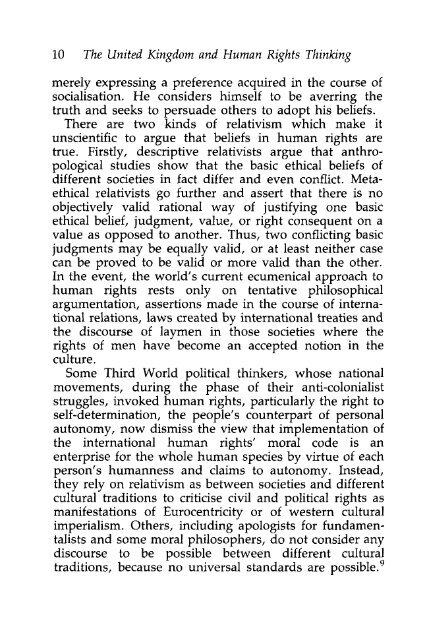The United Kingdom and Human Rights - College of Social ...
The United Kingdom and Human Rights - College of Social ...
The United Kingdom and Human Rights - College of Social ...
You also want an ePaper? Increase the reach of your titles
YUMPU automatically turns print PDFs into web optimized ePapers that Google loves.
10 <strong>The</strong> <strong>United</strong> <strong>Kingdom</strong> <strong>and</strong> <strong>Human</strong> <strong>Rights</strong> Thinking<br />
merely expressing a preference acquired in the course <strong>of</strong><br />
socialisation. He considers himself to be averring the<br />
truth <strong>and</strong> seeks to persuade others to adopt his beliefs.<br />
<strong>The</strong>re are two kinds <strong>of</strong> relativism which make it<br />
unscientific to argue that beliefs in human rights are<br />
true. Firstly, descriptive relativists argue that anthropological<br />
studies show that the basic ethical beliefs <strong>of</strong><br />
different societies in fact differ <strong>and</strong> even conflict. Metaethical<br />
relativists go further <strong>and</strong> assert that there is no<br />
objectively valid rational way <strong>of</strong> justifying one basic<br />
ethical belief, judgment, value, or right consequent on a<br />
value as opposed to another. Thus, two conflicting basic<br />
judgments may be equally valid, or at least neither case<br />
can be proved to be valid or more valid than the other.<br />
In the event, the world's current ecumenical approach to<br />
human rights rests only on tentative philosophical<br />
argumentation, assertions made in the course <strong>of</strong> international<br />
relations, laws created by international treaties <strong>and</strong><br />
the discourse <strong>of</strong> laymen in those societies where the<br />
rights <strong>of</strong> men have become an accepted notion in the<br />
culture.<br />
Some Third World political thinkers, whose national<br />
movements, during the phase <strong>of</strong> their anti-colonialist<br />
struggles, invoked human rights, particularly the right to<br />
self-determination, the people's counterpart <strong>of</strong> personal<br />
autonomy, now dismiss the view that implementation <strong>of</strong><br />
the international human rights' moral code is an<br />
enterprise for the whole human species by virtue <strong>of</strong> each<br />
person's humanness <strong>and</strong> claims to autonomy. Instead,<br />
they rely on relativism as between societies <strong>and</strong> different<br />
cultural traditions to criticise civil <strong>and</strong> political rights as<br />
manifestations <strong>of</strong> Eurocentricity or <strong>of</strong> western cultural<br />
imperialism. Others, including apologists for fundamentalists<br />
<strong>and</strong> some moral philosophers, do not consider any<br />
discourse to be possible between different cultural<br />
traditions, because no universal st<strong>and</strong>ards are possible. 9

















